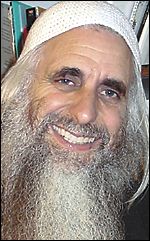 Orthodox Rabbi Menachem Froman, one of our Peacemakers in Action, and a group of five other rabbis provided a bold example of what it means to be a peacemaker, and to act. By entering Beit Fajjar only a day after the swift retreat of vandals who burned a mosque and a pile of Qur‘ans, Rabbi Froman and his peers showed the power of individual action; of citizens as diplomats.
Orthodox Rabbi Menachem Froman, one of our Peacemakers in Action, and a group of five other rabbis provided a bold example of what it means to be a peacemaker, and to act. By entering Beit Fajjar only a day after the swift retreat of vandals who burned a mosque and a pile of Qur‘ans, Rabbi Froman and his peers showed the power of individual action; of citizens as diplomats.
In so doing, the rabbis brought proximity and humanity to the escalating conflict. As Mark Gopin states in his most recent book about citizen diplomacy:
There is a unique place in citizen diplomacy for the power of the deed and the gesture… A person comes from one civilization and enters into another, with everyone fully aware that this person is crossing over boundaries of tension, distrust, and conflict.
Simply by entering the West Bank village of Beit Fajjar, the rabbis have moved against the mounting tension, problematizing the role of adversary cast for them. This is evident in an Al Jazeera quote from the president of the municipal council, Kamel Hammash, who said, “I believe that the Rabbis were genuine in their approach to make up for what was done… I believe that they are offering to help repair the major damage on the mosque, but I am not sure whether this will happen,” Hammash said.
There is uncertainty in that quote. That uncertainty is progress in a community where residents reported clashes between Israeli settlers and Palestinians only a day before.
This sort of activity, to the average person, may seem an unattainable level of action in the cause of promoting interreligious understanding and peace. We often feel incapacitated by the lack of a glaring opportunity or platform from which to act. And this is probably true, to a large extent. However, our modern world provides other platforms that allow us access to audiences from various cultures and religious perspectives. Individuals can harness technology to engage others and exchange ideas, with negligible limitations.
Take for example Mideast Tunes, a music website featured recently on NPR’s Morning Edition, which features the tagline, “Music for social change.” The website is a launching point for musicians from the Middle East to reach across borders and cultures to express their messages of social change with and through music.
Through this medium, artists such as Foad Manshadi, an Iranian Baha’i forced into exile by religious persecution, can reach a world audience. Foad uses rap music as an avenue to reach out to other Iranians and to the world to talk about the plight of the Baha’i in Iran. The popular website YouTube also provides an avenue for exposure by hosting music videos, through which Foad expresses a hope for peace, as well as a palpable generational despair. Such media give concrete voices and faces to static groups, and create an opportunity for cultural and religious exchange.
Another group featured on Mideast Tunes, Junoon, is a well-known Sufi-rock band from Pakistan. The site offers another platform for the group to reach world audiences with the peaceful message of its music. Guitarist and songwriter Salman Ahmad has also appeared in the BBC documentaries The Rock Star and the Mullahs and It’s My Country Too, both addressing religious themes and the tensions between and within religious communities. Ahmad has toured the Northwest Frontier Province as a sort of intrafaith diplomat, talking with his countrymen about the banning of music in the area.
These interactions with media allow Ahmad to extend his message of moderate Islam. During an interview with Mideast Tunes, Ahmad relates:
People around the world are using social media to chip away at religious intolerance as well. For example, Facebook Groups create the virtual space for individuals to connect across religions, engage in discussion, and create community among individuals of markedly different backgrounds. Examples of such efforts include Coalition to promote Coexistence, Religious Tolerance, and Peace, Movement for Religious Peace, and Interfaith Dialogue, which link more and more people each day to create a citizen movement for interreligious understanding.
Official actors have an important space to fill in creating the conditions for peace among adversaries, but citizens play a significant role as well. By harnessing new technologies to exchange cultural information, connect us in dialogue, and create greater understanding among us, citizens fill the space around official diplomacy and carry it forward. Peacemakers in Action such as Rabbi Froman provide extraordinary examples of the role of individuals in creating appreciation for each other; however, opportunities exist for us all to participate. Some avenues exist just at the ends of our fingertips.